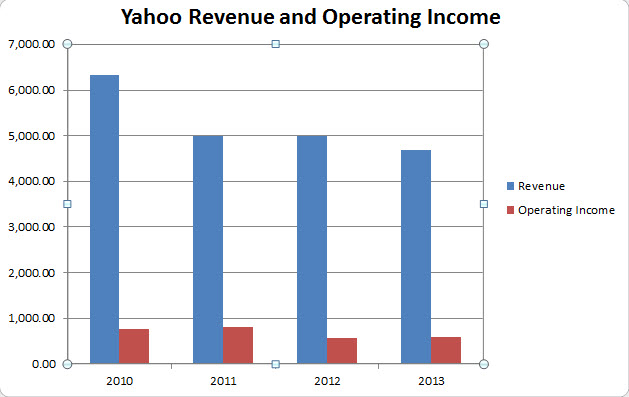Alibaba's IPO is fine, but where's Yahoo's turnaround?
The upcoming IPO of Chinese e-commerce giant Alibaba could be the biggest one since Facebook. The company could raise $15 billion, and Yahoo (YHOO) owns a quarter of the stock.
The inevitable cash infusion is good news for Yahoo and its investors and the IPO should represent another boost in valuation. Faith in CEO Marissa Mayer, who has proven herself far more likable and less divisive than former CEO Carol Bartz, seems to run high. And yet, analysis suggests that for all the talk, operationally Yahoo's core business is fundamentally the same, or maybe even worse off, than before she got there.
There are two basic ways to look at a company's performance: stock price and basic financials. On the stock valuation side, Yahoo would seem to have received a big boost. Since Mayer became CEO in July 2012, the company's shares have been on an upwards march, moving from just under $16 to about $38 today.
The increase is good for shareholders, but the real question is what has driven that growth. Yahoo's current market value is just over $39 billion. However, Alibaba has an estimated market value of $153 billion, according to a Bloomberg average of estimates in February. Twenty-four percent of that amount -- Yahoo's share -- is $36.7 billion.
The upshot: Markets believe Yahoo is only worth $2.3 billion, even though its annual revenue last year was just under $4.7 billion with before-tax income of $633 million. Except that it gets worse, as Matthew Klein pointed out on Bloomberg. Yahoo also owns 35 percent of Yahoo Japan, whose value is $32.3 billion. Subtract that $11.3 billion and youjare left with a company valued at less than zero.
People were coming to the same conclusions in September 2010. Back then, calculating the value of Yahoo's shares in Alibaba and Yahoo Japan, as well as the amount of cash on hand per share of stock, investors valued Yahoo's ongoing business at less than nothing.
Basic financials aren't any kinder toward the idea of progress at the company. A look at revenue and operating income gives an idea of how Yahoo has performed 20 months into Mayer's tenure:
Yahoo's core problem is that it hasn't had an underlying identity. The company is essentially a collection of unconnected services without a unifying theme, other than all belonging to the same company. Although it attracts significant traffic, Yahoo is having a tough time converting user interest into revenue. Adverting revenue continues to fall away.
Instead of structuring a unified company, Yahoo keeps adding to or bolstering its current collection. The company has reentered the gaming business. A deal with Yelp (YELP) is supposed to boost Yahoo's search engine relevance, even though almost a third of Yahoo's revenue comes from the search engine outsourcing deal it did with Microsoft (MSFT).
Money from Alibaba's IPO could fuel the company's quest for deals, like when it bought Tumblr. But Mayer's drive to acquire more companies only adds to the sense that she hasn't made much progress in taming the corporate hydra she inherited.
